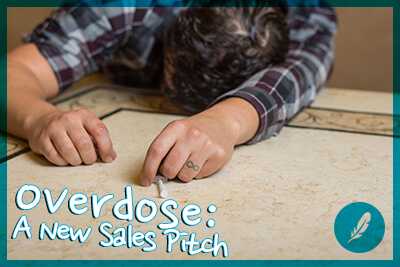Deadly Marketing: Is Overdose the New Sales Pitch?
In the past year, more and more frequently, fentanyl has been the cause of the steadily rising number of drug overdoses in Nevada and across the country. Often, people start out using prescription painkillers, and then when they can no longer afford the pills or get enough of them to maintain their addiction, they turn to heroin. Though illegal, heroin is far easier to get than prescription painkillers for many people and far less expensive. Unfortunately, it is just as dangerous. Since 2016, the addition of fentanyl, a highly potent synthetic opiate to heroin sold on the street has triggered a spike in overdose deaths.
The first question might be: Why? Why would drug dealers lace their product with a substance that is deadly in such small amounts? Why would they risk killing their customers?
It could be assumed that the overdoses are an accident, that they could be the result of overzealous dealers who are not scrupulous in their measuring and mixing. But when they happen so often, this reasoning becomes suspect. Some who are recently out of active addiction and on the road to recovery have a theory.

Says Cam S. of Las Vegas: “People don’t seem to understand: hearing that a batch of heroin might have fentanyl in is no deterrent when you are an addict. Not to everyone, anyway. It wasn’t to me. When I would hear that someone died because a batch had too much fentanyl, my first thought, honestly, was, ‘I gotta get some of that. THAT is the good stuff.’ My tolerance was so high that I couldn’t get well off heroin alone. I needed more than that. And if someone ODed after dosing, then you know it’s going to be strong.”
While it may not necessarily be the intent – to give someone a dose that is too high in fentanyl purposefully in order to get more customers when the word gets out that the batch was so strong it killed someone – it may be the result in some cases. At a certain point, more and more heroin doesn’t increase the high. People who are struggling to simply avoid withdrawal symptoms – or “stay well” – may be ready to take the risk of using fentanyl-laced heroin in order to ensure they avoid withdrawal.
Profit over People
It goes without saying that drug dealers who sell deadly substances to people who are struggling with a crippling disease, while also contributing to savage corruption and killing in the countries where these substances originate, are less concerned about their customers than they are about their bottom line. However, the fact that overdoses are occurring in such high numbers across the country and having the effect of spurring sales brings a new dimension to the discussion about whether or not drug dealers should be charged with murder.
Pushing the Limits
There are no boundaries in addiction. People who are living with the disease often feel consumed by the drive to get and stay high. Drug dealers, too, already working outside the limits of the law, have little or nothing holding them to any standard. On both sides, people are living outside the realm of rules and social standards, which often means that anything goes.
For family members who are watching someone be crushed under the weight of addiction, it can be heartbreaking to see them drift farther and farther out to sea. It is difficult to watch someone making choices that harm them and put their life in danger, but no matter how much you want someone to stay sober, the only research-based way for them to come back from addiction is to undergo intensive and comprehensive treatment.
Because active addiction is often defined by limitlessness and a lack of structure, addiction treatment offers the opposite. Though treatment is heavily focused on medical care and mental health treatment, a large element of the recovery process is learning how to create healthy standards for physical and emotional health, how to build and maintain functional relationships, and how to live within the bounds and expectations of society.
Says Cam S.: “I was one of those people looking for fentanyl. It took an overdose to get me into detox and treatment. I didn’t want to go but I knew I would die if I didn’t. I’ve got 132 days sober, and it’s still not easy. I don’t miss being sick, but it’s a whole different life now and that’s going to take more time to get used to.”